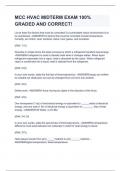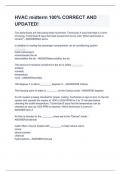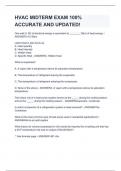Hvac midterm stuvia Study guides, Class notes & Summaries
Looking for the best study guides, study notes and summaries about Hvac midterm stuvia? On this page you'll find 3 study documents about Hvac midterm stuvia.
All 3 results
Sort by

-
MCC HVAC MIDTERM EXAM 100% GRADED AND CORRECT!
- Exam (elaborations) • 31 pages • 2024
- Available in package deal
-
- $13.99
- + learn more
List at least five factors that must be controlled if a comfortable indoor environment is to be maintained. -ANSWERThe factors that must be controlled include temperature, humidity, air motion, dust, bacteria, odors, toxic gases, and ionization. ((Ref: 1/1)) Describe in simple terms the basic process by which a refrigerant transfers heat energy. -ANSWERA refrigerant is used to transfer heat when it changes states. When liquid refrigerant evaporates into a vapor, heat is absorbed by the vap...

-
HVAC midterm 100% CORRECT AND UPDATED!
- Exam (elaborations) • 12 pages • 2024
- Available in package deal
-
- $12.99
- + learn more
Two technicians are discussing heat movement. Technician A says that heat is a form of energy. Technician B says that heat travels from hot to cold. Which technician is correct? - ANSWERBoth techs In addition to cooling the passenger compartment, an air conditioning system ________. heats passengers moisturisezes the air dehumidifies the air - ANSWERdehumidifies the air The amount of moisture contained in the air is called ________. ambient humidity temperature none - ANSWERhumidity...

-
HVAC MIDTERM EXAM 100% ACCURATE AND UPDATED!
- Exam (elaborations) • 9 pages • 2024
- Available in package deal
-
- $12.99
- + learn more
One watt (1 W) of electrical energy is equivalent to ________ Btu's of heat energy. - ANSWER3.413 Btus Latent heat is also know as. A. Heat quantity B. Heat Intensity C. Hidden Heat D. Specific Heat - ANSWERC. Hidden Heat What is superheat? A. A vapor with a temperature above its saturation temperature. B. The temperature of refrigerant leaving the evaporator C. The temperature of refrigerant entering the compressor. D. None of the above - ANSWERA. A vapor with a temperatu...

$6.50 for your textbook summary multiplied by 100 fellow students... Do the math: that's a lot of money! Don't be a thief of your own wallet and start uploading yours now. Discover all about earning on Stuvia


